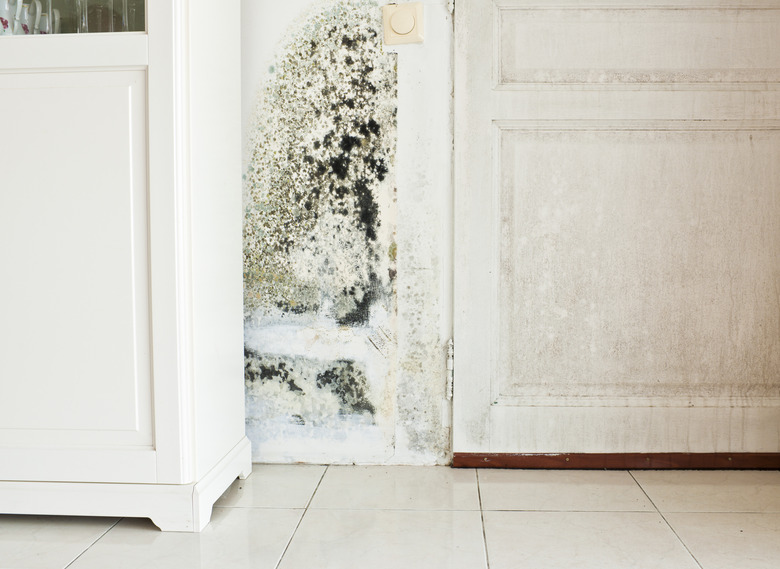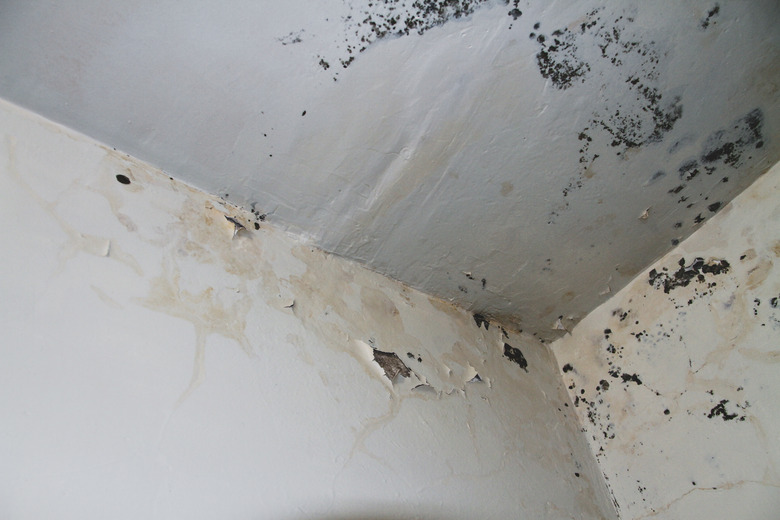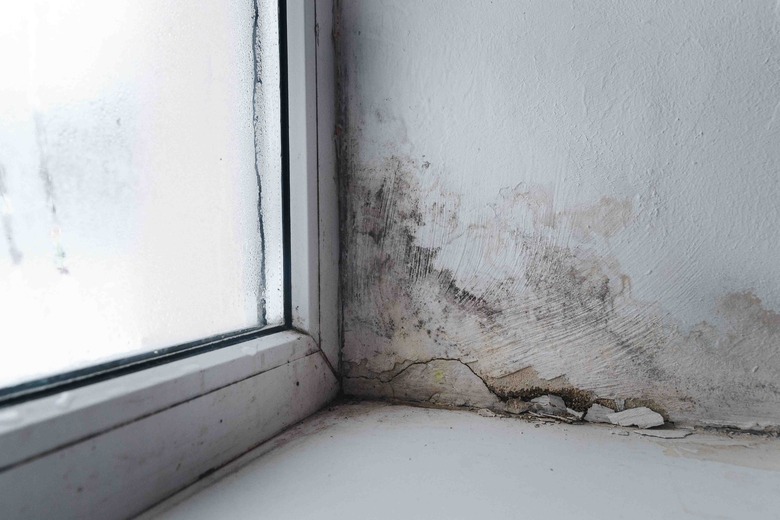Does Your Homeowners Insurance Cover Mold Damage?
We may receive a commission on purchases made from links.
If you discover mold lurking in your home, you'll want to know if your homeowners policy will cover mold removal. Unfortunately, there is no simple answer to this question. It depends on the particulars of your specific policy as well as the source of the mold. Even if you are covered, you may find yourself subject to coverage limits.
Tip
Generally, a homeowners insurance policy will cover mold damage caused by a covered event, such as a broken appliance or burst pipe. Problems due to a natural disaster like a flood (which would require a separate flood insurance policy) or ongoing problems, like a slow water leak, usually are not covered.
When You're on Your Own
When You're on Your Own
Unfortunately, there are some situations in which your homeowners insurance just isn't going to cover mold issues. One is when the policy specifically states that mold is excluded, so read your policy carefully. Any policy may include this exclusion, but it's most common in humid regions where mold is more likely to cause issues.
Remember that homeowners insurance doesn't cover flood damage, and this includes mold problems caused by flooding. If you live in a flood zone, you'll need to purchase additional flood insurance, which may or may not cover mold damage. FEMA flood policies and many others do not cover mold. Read your policy carefully and talk to your insurance agent about whether or not you need to add a mold rider to your insurance coverage.
Mold also isn't covered if your insurance company can claim you were negligent. Say, for example, you notice a minor leak around your bathtub. The leak is small and not a huge issue, so you make a mental note of it and put it on your to-do list for later, but life gets busy, and later never comes. If you then find mold near the leak, your insurance won't cover the problem because you failed to repair the tub leak right away to prevent it.
When Insurance Will Cover Mold
When Insurance Will Cover Mold
Some good news is that your homeowners insurance should cover mold issues if they are related to what insurance companies dub "a covered peril." For example, your homeowners policy probably covers fire damage. If you have a fire and find mold a few days after the firefighters douse your home with water, the insurance should cover any necessary mold removal and repair.
In short, if your mold problem directly relates to a problem that your insurance company covers, it will generally cover related mold issues too. If your policy covers appliance malfunctions (for instance, mold appearing at the base of your kitchen cabinets after your dishwasher floods your kitchen), it will likely be covered. The same is true for mold caused by a burst water heater or a roof that leaked after a tree branch fell in a storm.
Of course, your insurance company must also cover mold damage if you paid extra to add mold coverage. If your basic homeowners policy (or flood insurance policy) denies mold coverage but you purchase a rider — an extra insurance benefit — to get it, your insurer must abide by the terms of that rider. Bear in mind, however, that not all insurance companies sell these riders, and others limit them in certain parts of the country with high humidity levels. You may not be able to get a mold rider at all in Florida, for instance, and if you can, it may be expensive.
Even if your homeowners insurance does cover mold, understand that it may have limits. The size and severity of mold problems vary, of course, but mold remediation can easily cost $15,000 to $30,000. After paying out massive amounts of money for mold claims, insurers started instituting coverage limits or doing away with mold coverage altogether in the 1990s and early 2000s. As a result, it's not unusual for insurance companies to max out mold coverage anywhere between $5,000 and $10,000.
Making a Claim
Making a Claim
If you feel your insurance company should cover your mold issue, there are some steps you can take to improve the chances that it will approve your claim. The first step is to contact your insurance company and make it aware of the problem as soon as you can.
Next, do what you can to improve the situation without disturbing anything an insurance adjuster will want to see. Dry out the area if you can by opening doors and windows and running a dehumidifier if you have one. Take ample pictures and videos to document the mold itself and the source if you know it. If you're not sure, don't guess. Instead, ask your insurer for an investigation.
If you feel the mold is a result of a recent claim you made for a covered peril, gather the paperwork, photographs and any other information you have relating to that claim. Your insurance company should have access to this information on its end, but it's always better to be prepared.
Do not attempt to clean the mold yourself or alter it in any way. Don't apply bleach, disinfectant, paint or any other solutions to the affected area. You want the insurance company to see what you're seeing and pay a professional to do the repairs. Don't give your insurance company any reason to argue that you made the situation worse and then deny your insurance claim.
If You're Denied
If You're Denied
Hopefully, you won't have trouble getting your mold claim covered, but claim denials do happen. If your insurer denies your claim but you feel it's valid, ask how you can appeal the decision. When appealing, hire a professional mold remediation service to prepare a written assessment for you that includes a determination of the mold's source if possible.
You can also contact your state's insurance commissioner. It can help you determine your next steps. If you ultimately lose your appeal, you can at least file a complaint with the insurance commission if nothing else.
Mold Prevention Tactics
Mold Prevention Tactics
Both you and your insurer will be happiest if you never need to make a mold claim at all. If you do need to file a claim, it may help your case if you can show that you've taken steps to try and prevent mold when and where you could. Nobody can predict a burst pipe or broken water heater (resulting in unexpected water damage), but there are steps you can take to prevent mold growth in other situations.
Mold is caused by a fungus that is everywhere. As such, a wet situation can create mold in as little as 24 to 48 hours. If you do experience a burst pipe, broken appliance or wet basement, fix the situation and dry things out as quickly as you can. It may take a few days for your insurance company to fix your broken dishwasher, for instance, but clean up any standing water and try to keep things as dry as you can in the meantime.
If you know your basement or another part of your home is prone to humidity, run a dehumidifier to keep dampness under control. Try to keep the overall humidity in your home between 30 and 60 percent and avoid carpeting areas you know are prone to dampness. Make sure your kitchen, bathrooms and laundry area are properly vented to the outside, and clean wet areas with bleach periodically to discourage mold. It's also smart to replace the water supply hoses on your dishwasher, refrigerator, washer and other water-using appliances every five years.
Keeping your gutters clean will help prevent ice dams from causing leaks in the winter and rain from running into your basement in the summer. Inspect your roof for leaks periodically and do the same with exposed plumbing where you can. If you live where it gets cold, make sure your pipes are properly insulated against freezing winter temperatures. Remember that negligence isn't covered, so it pays to do what you can to help yourself.


